 | Dear ~~first_name~~,
There is little doubt that the last months of 2019 will be remembered for bushfires throughout Australia, the exhaustion of firefighters, and heightened debates about adaption to climate change. The TASA Conference at Western Sydney University Parramatta campuses and ensuing Thematic Group symposiums highlight the continuing relevance of sociological investigations into contemporary urban, regional and rural communities. William Calcutt’s paper, based upon his recent postgraduate research, investigates the challenges facing emergency services in the context of difficulties in recruiting and retaining volunteer emergency service personnel.
Reports from the Rural Issues thematic group, the Sociology of Religion thematic group, the Migration, Ethnicity and Multiculturalism thematic group, the Sociology of Education thematic group, the Families and Relationships thematic group, as well at the Health thematic group, all highlight the vibrant research and discussion taking place within the thematic group forum. Each of these reports attests to the vitality and strength of thematic groups within TASA.
Bruce Curtis’ ‘Southern Notes’ highlights important challenges facing the Adern Labour government in the ongoing, yet contested, discourses of neoliberalism and populism.
Long-time TASA member, Alan Scott, has been producing a monthly newsletter dedicated to Applied Sociologists within TASA since 2011. He recently decided to stop production of the monthly notes. TASA marks his extensive service to TASA and applied sociology members with the compilation of the newsletters into a book format. TASA President, Dan Woodman, recently launched the book at TASA2019 and the video is available at this link.
Roger Wilkinson
Digital Publications Editor
The Australian Sociological Association
digitalpe@tasa.org.au
| Emergency service volunteering: Current & future challenges | Introduction
My article in Nexus (Vol 29, No. 2) in August 2017 foreshadowed research being undertaken under the auspices of the Bushfire and Natural Hazards Cooperative Research Centre (BNHCRC) and the University of Wollongong that was examining the contemporary forces impacting on the resourcing of the emergency service volunteer workforce in Australia. This article summarises the key findings of a Master thesis titled “Valuing volunteers: better understanding the primary motives for volunteering in Australian emergency services” that is available at this link. The Valuing Volunteers study provides new insights on the motives for formal emergency service volunteering through empirical research on volunteers’ shared and contrasting values, and critically evaluates the broader policy and social contexts for such important and essential civic participation.
Emergency services are responsible for the protection and preservation of life and property from harm resulting from emergency events, and include the fire service organisations, ambulance service organisations, State emergency services, marine rescue and coast guard organisations, and lifesaving organisations. Volunteers are the lifeblood of emergency services in Australia and are integral to the nation’s emergency management capabilities and overall disaster resilience. The concurrence of an increase in the risks posed by a range of climate change-related natural hazards and a decline in formal volunteering rates threatens Australia’s emergency preparedness.
The study explores five key research objectives:
• Demonstrate that emergency service volunteering represents exceptional civic participation
• Establish the validity and utility of a values framework for interpreting and understanding the primary motives for emergency service volunteering
• Determine the distinct shared and contrasting values of a sample of emergency service volunteers
• Evaluate the efficacy and integrity of current processes for determining national emergency management priorities
• Identify trends in changing core values with implications for future forms of civic participation, including emergency service volunteering.
Research findings
In respect to the first research objective, the study identifies the unique circumstances and distinctive characteristics of emergency service volunteering that justify its description as exceptional civic participation. These include: the physically and psychologically demanding nature of emergency response roles; the level of dedication and personal commitment required to sustain emergency service volunteering; the specialist competencies required to undertake emergency tasks safely; and the social and economic value to the community of the unpaid services provided by volunteers. The research highlights that the goodwill required to sustain volunteer commitment can be fragile and is easily exhausted, particularly when motivating values are not satisfied or are challenged.
In respect to the second research objective on the validity and utility of a values framework, the study demonstrates the efficacy of a values construct as a comprehensive, multi-dimensional and multi-disciplinary theoretical framework for interpreting and understanding diverse individual and social behaviours. The study finds that values are powerful motivators, with shared core values reinforcing volunteer commitment and retention, and conflicting and amorphous values contributing to volunteer turnover. Volunteering is a cultural phenomenon that reflects the community’s attitudes towards duty, civic responsibility and concern for the welfare of others (altruism).
The study utilised the Schwartz Theory of Basic Human Values as a theoretical framework to highlight congruities and conflicts between ten basic and four higher-order values across two bipolar dimensions. Schwartz (2005, p.1) defines values as “desirable, trans-situational goals, varying in importance, that serve as guiding principles in people’s lives”, and has been instrumental in the development of an integrated values framework that has been widely applied and extensively evaluated across multiple organisational and national settings over two decades. The Schwartz values framework had particular relevance to this study as the bipolar higher-order dimensions (self-transcendence versus self-enhancement and conservation versus openness to change) largely align with the major trends currently impacting emergency service volunteering in Australia (declining altruism and pressures for corporatisation).
The third research objective necessitated the empirical examination of the values preferences of the NSW State Emergency Service volunteer workforce through the utilisation of the Schwartz Portrait Values Questionnaire (PVQ-40) survey, ultimately attracting 522 respondents. The survey revealed statistically significant differences in values preferences by gender and generation, with female volunteers expressing a clear preference for the higher-order value of self-transcendence (altruism), and males and younger (Gen Y) volunteers expressing a clear preference for the contradictory higher-order value of self-enhancement (egoism).
The fourth research objective critically evaluates Australia’s national all-hazards risk management policy that commits to determine national emergency management priorities on the basis of evidence and objective analysis of relative risk, not emotion or ideology. The study finds that despite the established risks and demonstrated harms (including significant mortality) posed by a range of hazards (including natural hazards), Australia’s national emergency management priorities are dominated and distorted by fear-based perceptions of terrorism. A terrorism connotation distorts all that it touches, removing any sense of proportion or objective perspective on relative risk, and reinforcing a community-wide phobia and sense of insecurity. As a result, inestimable public resources are dedicated to counter-terrorism (where the harms in terms of mortality are relatively limited and/or amorphous), while the task of defending communities from the devastating effects of natural hazards (where the harms in terms of mortality are clear and have been severe) is devolved to unpaid and under-resourced emergency service volunteers.
The fifth research objective examines trends in evolving community values in Australia, finding that technology is facilitating fundamental changes in shared core values and social norms, leading to a rise in individualism and growing social atomisation. A community-wide decline in altruistic values and changes in the nature of civic participation are reflected in ABS data on the level of formal volunteering in Australia, with a drop from 34% in 2010 to 31% in 2014. The research notes that Australia may be particularly susceptible to volatile values due to the absence of an established and consistent national values framework (in a Constitution or Charter), and deficits in principles, ethics and humanity are apparent in many aspects of Australian society.
Implications
The implications of these findings for emergency service volunteering in Australia are significant. A decline in altruistic values is already making the recruitment and retention of formal (committed) volunteers challenging, with the potential that in the future it may be more difficult to mobilise and sustain an adequate skilled volunteer workforce in the face of a large-scale or protracted emergency event. The research highlights the critical role of organisational culture, in particular the importance of shared core values, in sustaining volunteer commitment and retention. Shared core values can be the “glue” that keeps people together for a common social purpose. This means that agencies are faced with critical choices about clearly defining their core values, and the nature of the work culture that they are seeking to engender. Given that thousands of (partly autonomous) emergency service units are scattered across Australia, each with its own unique culture, developing and sustaining a consistent organisational culture may pose particular challenges.
The research also reveals the presence of divergent and potentially conflicting values preferences within the existing volunteer workforce (by gender and generation), raising the possibility that incongruous or unsatisfied values may be contributing to volunteer turnover. It may be difficult to sustain a culture that accommodates and meets the needs of both altruistic and egoistic values, and agencies may be forced to decide where they can source sufficient numbers of suitable candidates and tailor their marketing accordingly. This could, for example, mean emphasising the altruistic and intrinsic (community benefit) dimensions of emergency service volunteering, with recruitment mainly targeting females and older volunteers who share these values. Alternatively, marketing could emphasise the egoistic and extrinsic dimensions of emergency service volunteering (how it meets individual and personal needs), with recruitment mainly targeting males and younger volunteers who share these values.
Whatever values choices emergency services make, satisfying and managing the different values needs of an increasingly diverse emergency service volunteer workforce will require a more nuanced approach that emphasises the values of encouragement, respect, inclusion, competency and integrity.
Bill Calcutt PSM
wgc447@uowmail.edu.au
November 2019
| If you had asked me last year about the future of the newly elected, Jacinda Ardern-led, Labour Government, I would have said that with our system of proportional representation, one-term governments were near impossible. The Curtis thesis (this means that no one else seemed to agree with me) was that Mixed-Member Proportional representation (MMP) replaced First Past the Post (FFP) in 1996, precisely at the point where the electorate realised that in terms of neoliberal policy, Labour and National were Tweedledum and Tweedledumber. You might say that the Deep State in New Zealand was a thoroughly neoliberal one. MMP wasn’t intended to transform politics (as claimed by its proponents) but to continue the centrality of neoliberalism. MMP secured neoliberalism by softening the edges of a neoliberal economic core; by giving choice that is no choice extra legs. Coalition Governments -National and a junior partner or Labour and a junior partner- acted to decrease the periodicity, lengthen the intervals, at which the electorate became sufficiently disillusioned with the incumbent proponents of neoliberalism to vote in the other lot. This is especially so when ‘junior partner’ means New Zealand First (a one nation conservative party that has prospered from jumping ships (waka) between elections). Winning an election under MMP indicated that you had 6 to 9 years in office.
Labour were a write-off in the lead up to the General Election of 2017; that is until Jacinda was appointed leader of the Opposition seven weeks prior. Boom. The world changed, not because Labour got more votes than National, but because kindly Jacinda was able to lead a coalition of NZ First and the Greens. Right, I thought. Nine years. Labour can cycle out NZ First if anti-immigration turns out to be unpopular or cycle out the Greens if it does (and no one fancies a capital gains tax). Jacinda can travel the world attaching her brand to Justin but not Jeremy. Maybe I was wrong. Labour is starting to look pretty one termy.
Kindly Jacinda has quickly morphed into wistful Jacinda. I’ll put to one side the startling rapidity by which kindness as inclusiveness, engendered by the murder of 51 Muslim people on 15 March 2019, has returned to business as usual in terms of immigration quotas and ethnic profiling. This is the inverse law of care; no surprises there. A more structural issue is the economy. Everyone is a Keynesian now, and given the world-historic defeat of the working class over the last 30 (40, 50?) years, coupled with the Global Financial Crisis, populism is the mechanism by which it is delivered.
Populism doesn’t sit well with Labour; austerity does. A Labour Government introduced neoliberalism when they were elected in 1984, and ever since budget surpluses have been a real problem for them. Helen Clark’s government (1999-2008) was cursed with budget surpluses and had to find creative ways to spend it while adhering to the core tenet of neoliberalism: make the rich richer and the poor poorer. Tax-funded transfers of income can mess this up (even when, as usually happens, the middle class are the biggest soak). Thus, under Clark (who was not at all kindly, but technocratic) there was a big spend up for the New Zealand Army (lots of armoured personal carriers were bought and are in a warehouse somewhere) and the Navy got some new boats and ships, several of which have left port when the weather has been clement. Kindly Jacinda has a budget surplus, and this is why she is wistful. A surplus makes being kind doable. It is increasingly hard for Labour (the social progressives) to find plausible ways of spending a surplus that doesn’t help poor people. There are limits to how much debt we can retire to future proof the economy. There are limits to how many roads we can build for the same reason. Labour can’t even spend public monies on doing up neglected utilities prior to their sale to transnational companies, because they have been sold. The subsequent re-nationalising and then re-selling scam takes too long. The new owners are yet to degrade their new assets. While a Scrooge McDuck Money Bin might be a useful tourist attraction, we already have Hobbiton and when Ardern signed us up to the wildly unpopular TransPacific Partnership Agreement (sorry, I mean Comprehensive and Progressive Agreement for TransPacific Partnership) Disney got veto rights on all policy decisions. (No fact-checkers were harmed in the writing of this column). I’ll draw a breath…. Did someone mention promises to build thousands of houses… for the (deserving) poor? Labour’s key housing initiative (pre-election promise) has sunk. This isn’t surprising because the initiative involved using ‘the market’ to supply affordable housing. Guess what? The market can’t supply affordable housing. New Zealand is a low wage economy with unaffordable housing. We could increase the minimum wage and build social housing for rent but that would reverse neoliberalism. Labour and National will resist this all the way.
More pointedly, Jacinda is wistful because I think she realises she is Prime Minister of the last neoliberal government. This is a sea-change and her tide is going out. It has happened before. Way back in 1984, Rob Muldoon realised that he was the last leader of a social democratic government. As I recall, he looked pretty wistful too, got drunk and called a snap election. Muldoon could have survived this transition to populism. Indeed this is precisely the alliance he assembled but couldn’t hold for a fourth term– right wing Keynesian with a sprinkling of authoritarianism (whoops, I mean ‘social conservatism’). Ardern can’t pivot in this way. I don’t think Labour can either, at least not in time. Maybe it will take more than the year left to Labour before the next election for the wheels to fall off. Labour are certainly helped by the paucity of leadership in National. But Arden and Scott Morrison have demonstrated that ‘comes the time comes the (wo)man’ only has to last until the votes are counted on election night. Populism is the incoming tide, and all National needs is someone to steer the boat, ummm ship of state.
Plus, the All Black lost the Rugby World Cup. No government can survive an aberration like that. It is a once in a generation event. We always win the World Cup. It is a thing.
Hei konā mai,
Bruce Curtis
bcurtis@waikato.ac.nz
| Rural Issues Symposium:
The Future of Rural Sociology in Australia
Christina Malatzky
| On the 28th of June 2019 the TASA Rural Issues thematic group held a one-day research symposium focussed on the future of rural sociology in Australia. The event brought together students, researchers, applied sociologists, community and social services professionals and academics engaging with a range of issues pertinent to rural, remote and regional Australia. It aimed to facilitate in-depth dialogue between attendees and provide opportunities to identify and engage with potential collaborators from a range of backgrounds and with different expertise.

The day started off with a keynote from Professor Barbara Pini (Griffith University). Barbara provided an exceptional foundation for the presentations to follow by situating the current place of ‘rural sociology’ within Australia, the historical features of rural sociology, her own responses as a researcher, and reflections on what the current state of play means for rural sociologists and rural people today. Barbara also set many people’s reading lists for the year!

The next session featured four papers (‘A sociological retake on ‘rural’ sociology’ delivered by Dr Lucinda Aberdeen and Dr Janet Congues; ‘The contribution of agri-food scholarship to Australian rural sociology’ delivered by Professor Geoff Lawrence, also on behalf of his co-author Dr Kiah Smith; ‘Resistance and Emergence: Reflections from a multi-sited ethnography in Aboriginal Victoria’ delivered by Sidrah McCarthy and ‘The socio(logical) determinants of rural health’ delivered by Professor Deborah Warr and Claire Seaman) focused on the development and potentialities of rural sociology in Australia. These papers highlighted the significant role and strength of rural sociology to address real world issues, in context-centred ways. Within this session, it was a privilege to hear about the developing scholarship of PhD candidate Sidrah McCarthy who is asking important questions about what the concept of marginality offers to understanding ‘Indigenous efflorescence’ in relation to accessing economic, social and political opportunities and how we can better interrogate complex interactions between place, community and Indigeneity. The second keynote from Professor Robyn Eversole (Swinburne University) built on the arguments presented across these four papers and made a strong case for rural research and ‘co-creating knowledge for a transformative research agenda’. Robyn encouraged us to focus on the ‘challenge of impact’ in our research, and detailed different approaches to knowledge production and impact, and importantly, knowledge for rural futures.

After lunch, there was a session of six papers addressing key social issues for rural communities. These papers covered a range of pertinent issues including: the manifestation of patriarchy within rurality and feminist challenges to constructions of the fathering role (Dr Chris Brown); young rural women’s experiences of workplace violence (Dr Jacqui Theobald and Dr Paulina Billett); the key challenges involved in engaging with the complexities, differences and politics of suicide prevention in rural communities (Dr Scott Fitzpatrick); debates about ageing in rural places (presented by Dr Donald Alexander); the social and spatial im/mobilities of migrants and refugees within the regions, and the social and community costs of restructuring farming (Dr Diane Luhrs). These papers provided a rich framework to and understanding of the complex and interrelated dimensions of social relations within rural contexts and were followed by two papers focused on young people in rural place. These papers considered social relations within young people’s rural multicultures (Dr Rose Butler) and imagined young people beyond the metropole, asking important questions about place, affect and temporality and how young people are imagining futures within rurality (Dr Kate O’Connor).
The following session featured four papers centred on rural approaches and policy in the domains of rural and regional education, and opportunities for work and wellbeing in regional economies. These papers clearly portrayed the strength and value of rural, as opposed to metrocentred approaches to education in particular, and made a strong argument for re-situating knowledge and knowledge production within rural communities. Metrocentric norms were challenged and alternative potentialities and opportunities in shifting dialogues and dominant narratives highlighted. The final paper in this session delivered by Dr Katharine McKinnon brought these debates into the realm of work and workplaces and made a strong argument for understanding workplaces as spaces of care.
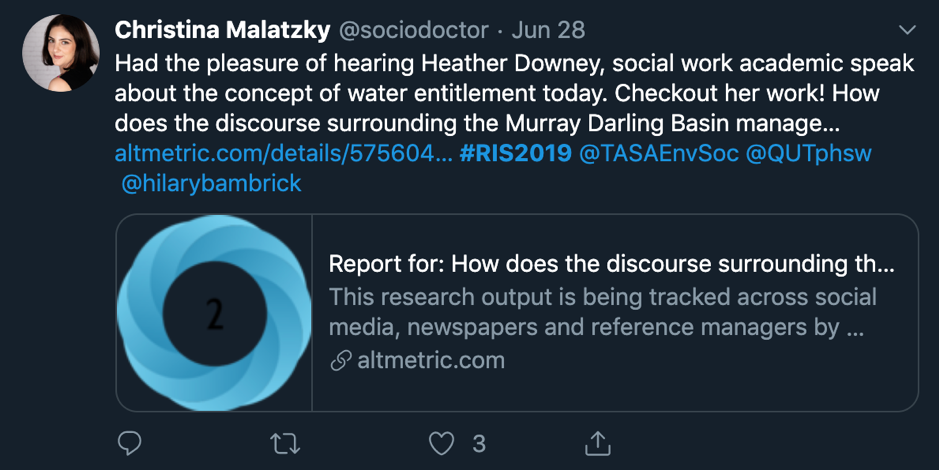
The day culminated in two papers on rural environment. Dr Heather Downey presented a paper focused on understanding the concept of water entitlement, specifically in relation to discourses surrounding the Murray Darling Basin, which raised central questions about how the concept of water entitlement is constructed under agrarian and neoliberal discourses and whose voices and positions are privileged, and which are marginalised in this process. Finally, Dr Edgar Burns delivered a paper, also on behalf of colleagues, focused on how we can ‘know rural Australia’ through digital methodologies.
The symposium generated great interest – over double the number of presentations were delivered than originally anticipated and the event was well attended for a niche sociological area of expertise. The symposium was attended by regional city social policy and planning officers as well as representatives from the Regional Australia Institute, who have since contacted the Convenor to discuss ways they can support improved political and public engagement with Australian rural sociological research. The scholarship presented during the symposium formed the basis of a Special Issue proposal to the Journal of Sociology, which has been successful. The upcoming World Congress of Rural Sociology was also promoted during the event and some members of the group plan to re-convene at this event, along with international colleagues who are also contributing to the Special Issue. Importantly, through the symposium some rural sociologists (and related fields) met one another for the first time, and there was much discussion about further connecting and building on ideas shared and potential collaborations identified during the day.
The Rural Issues thematic group thanks TASA for funding this event. Thanks must also go to La Trobe University Bendigo for hosting us, and Dr Naomi Stekelenburg and Dr John Cauchi from QUT’s School of Public Health and Social Work for supporting the event (and keeping the Convenor calm). The biggest thanks goes to attendees, with a special mention to those who tweeted throughout the day.
| Sociology of Religion Symposium:
Religion and Race
Rosemary Hancock and Alan Nixon
| Australia has recently seen the return of ‘race politics’ which is often connected to the religious faith of those being racialized. It is evident in discussions of Middle Eastern migrant communities, which are inevitably associated with Islam despite Islam being a global religion and the Middle East being religiously diverse. This discourse treats Islam as a monolithic whole and racializes Muslims and those who appear to be Muslim, ascribing particular characteristics such as violence and criminality, and oppressive attitudes towards women and sexual minorities. Such discourse fails to recognise the diversity within Islam, both in terms of its different legal schools and the cultural and geographical particularities that exist. At its worst, the racialisation of religion results in acts of violence, such as those perpetrated against Muslims in Christchurch on March 15th this year.
Whilst the study of the intersections between race and religion is a fast-developing field, the bulk of this work is conducted in the United States with a smaller proportion in Europe. In April this year, TASA’s Sociology of Religion Thematic Group brought together four Australian sociologists examining the racialisation of religion in Australia with the goal of connecting scholars and students interested in this field and discussing the unique ways in which religion and race intersect in Australia. Professor Fethi Mansouri (Deakin University), Professor Kevin Dunn (Western Sydney University), Professor Farida Fozdar (University of Western Australia) and Dr Jennifer Cheng (Western Sydney University) spoke to an engaged audience of approximately 25 people at Western Sydney University’s Liverpool Campus. The location of the event was highly appropriate given the large variety of cultures and religions present in the Western Sydney area, particularly in south west Sydney where the event was held. The event included a mix of undergraduate and research students, early-career researchers, established academics, and community organisation members from Sydney and Melbourne.
Professor Mansouri, Professor Dunn, and Dr Cheng all focused on the various aspects of the racialisation of Muslims in Australia. Professor Mansouri outlined the theoretical challenges of countering Islamophobia in the context of a secular society that problematises religiosity. Professor Dunn presented us with a statistical dissection of Islamophobic attitudes and how they intersect with various social and political factors. Dr Cheng analysed discussions around anti-Muslim racism in social media and discussed the prevalence and forms of the denial of racism in Australia. Their presentations examined the unique aspects of the Australian environment with relation to Muslims, the impact of racial discrimination on Muslim Australians, the forms racialisation took in discourse, and how it is disseminated through Australian media and social media. The final presentation of the day, from Professor Farida Fozdar, examined the construction of a white Christian identity which is weaponised against Australians of other racial and religious backgrounds. Professor Fozdar’s presentation was an excellent and appropriate end to the day: although much of the current work on religion and race both in Australia and internationally focuses on Islam, race and religious identity intersect across a range of other religions in Australia to produce various discourses of ‘othering’ both inside and outside religious communities. The relationship of Christianity to whiteness and Australian identity is very pertinent to this discourse: particularly in light of current political discourse on migration policy.
Following the final presentation, the question and answer time morphed into an elongated and lively discussion between the audience and all four of the invited speakers. Audience members raised both their own personal experiences of religious and/or racial discrimination in Australia, and reflections on research conducted elsewhere, to draw out the conversation on the intersection of race and religion in Australia. The engagement of the audience – and indeed the good turnout for an event held on the Friday after Anzac Day and the Easter Long Weekend – showed the interest in this emerging area of research amongst sociologists in Sydney, and perhaps its timeliness given the events of 2019 to-date.
| Migration, Ethnicity & Multiculturalism Symposium:
NextGenMEM
Heidi Hetz, Jora Broerse & Charlotte Young
| The NextGenMEM symposium was held on 03 October 2019 at the Immigration Museum in Melbourne. The one-day event was co-hosted by the Migration, Ethnicity and Multiculturalism (MEM) Thematic Group of The Australian Sociological Association (TASA) and the Monash Migration and Inclusion Centre. The postgraduate organisers were Jora Broerse (Victoria University), Heidi Hetz (University of South Australia), John van Kooy (Monash University), Goshu Tefera (Monash University), Charlotte Young (Australian Catholic University). Associate Professor Rebecca Wickes (Monash University) took up the role of MC.
The symposium was designed to offer postgraduate students and early career researchers the opportunity to engage with contemporary migration challenges as they set out to become the next generation of migration scholars, policy influencers and practitioners. This student-led, multi-university initiative featured academics, practitioners, and community organisations in discussion on research, public engagement, and cross-sector collaboration regarding migration, refugee settlement, integration and diversity. The final program can be accessed here.
All 50 tickets for the event were sold. Two travel bursaries were awarded to PhD candidates Sarah Burrage from the University of South Australia and Ume Rubab Sheikh from the University of Sydney. In addition, TASA funding enabled the attendance of Dr Shanthi Robertson from Western Sydney University who facilitated a workshop entitled Using Digital Methods in Migration Studies and chaired a panel.
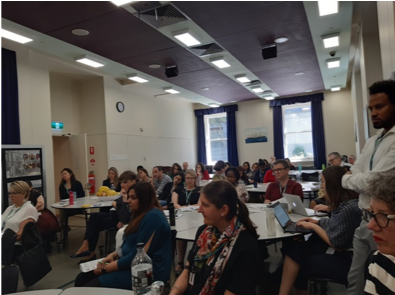
Picture 1: Attendees
David Tournier from the Boon Wurrung Foundation started the symposium with the Welcome to Country ceremony and explained that the word Womendjeka for Welcome means “Come with purpose”, which set the tone for the day and reverberated through much of the day’s discussion.
The keynote presentation was given by Professor Sharon Pickering from Monash University. Pickering identified six key areas of training for the next generation of migration research leaders:
- Articulate your intellectual ideas and relate them to big ideas
- Learn another methodology and do not limit yourself to one methodology. This also includes acknowledging and understanding the importance of AI and big data for your research
- Connect with other disciplines outside of HASS to engage with and influence a different audience in order to increase the impact of your research
- Publish your research where it gets used and be ambitious in submitting to high ranking journals. The quality of research in Australia is strong but mostly disappointing in terms of influence
- Make use of infographics to reach a wider audience and have greater influence- if you can draw it, you can influence!
- Generational change is a collective endeavour! Connect with your colleagues and work together, be each other’s assets.
The next session was a Nextgen researcher panel with early career researchers Dr Ashleigh Haw from University of Melbourne, Dr Allegra Schermuly from Monash University, and Dr Laurel Mackenzie from RMIT University. The session was chaired by Dr Helen Forbes-Mewett from Monash University. The panellists discussed their transition from the PhD into academic, research and policy careers which often included periods of precarious employment. Key learnings included the importance of passion combined with a pragmatic approach, the need to be proactive and to network, and the challenges of handling guilt, overcommitting and imposter syndrome.
After morning tea, Dr Shanthi Robertson spoke about using digital methods in migration research. Robertson explained that digital technology transforms migration dynamics as well as research praxis. The session highlighted the importance of being clear about the role of the digital in the research project: whether it is the object of analysis or data source, a space where the research is conducted, a research tool, or a tool to disseminate findings. Equally, the presentation raised questions about the implications of the digital for scholarly publications and other outputs; for researcher skills, institutional resources and contingency plans; research ethics; and contributions to the field.
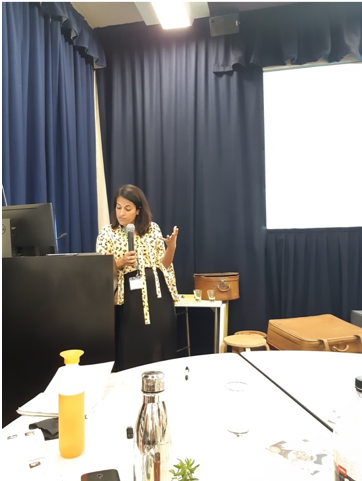
Picture 2: Dr Shanti Robertson
The next session was delivered by Associate Professor Jane Wilkinson from Monash University on ethics and care in migration research. In her talk, Wilkinson highlighted the various roles we fulfil, including as researchers, activists, advocates, social critic, policy informant, and political campaigner. The session emphasised the need to ask the following questions about research: when, for whom, in whose interests, who may gain/lose/to what end? Wilkinson also pointed out the need to conduct research in ways that humanises rather than colonises and that “relationships of dignity and care” are built “for both researchers and participants”.
After lunch, Professor Karen Farquharson from the University of Melbourne spoke about communicating ideas about migration, integration and diversity. Farquharson identified the role of researchers in this field as reporting findings, providing expert evidence and informed analysis, providing commentary, and contributing to discussion. Farquharson outlined the importance of having a publication strategy and shared examples of her own communication strategies from previous projects. The strategy included producing traditional research outputs namely, journal articles, conference presentations and symposiums, and a research report, but also online infographics, articles in The Conversation and in university magazines, a media training program, and engagement with key stakeholders to support the implementation of recommendations.
The second panel discussion was entitled ‘Cross-Sector Collaboration: Applying & Sharing Knowledge’, with panellists Asher Hirsch from the Refugee Council of Australia (RCOA), Aleem Ali from Welcoming Cities, Najma Hassan from the East African Women's Foundation, and Tina Hosseini from the Victorian Multicultural Commission. The session was chaired by Dr Shanthi Robertson. Hirsch emphasised the ongoing importance of policy development informed by research which has led to the establishment of a refugee policy advisory committee by RCOA. Aleem explained that inclusion requires collaboration, partnership, ongoing support, and various levels of expertise. Welcoming Cities supports knowledge sharing, evidence-based research and practices, case studies, connections, and sets a national standard for inclusion policy in local government. The panel highlighted the importance of working with refugee communities in identifying areas of research and reporting findings back to these communities. More than this, the panel highlighted that in order to have more influence academics may need to rethink what they mean by impact as politicians are unlikely to read academic journal articles. Governments are working on time-sensitive policies and so wish to know, in the simplest way, what to do. The panel put forward that academics have a duty to influence policy and suggested that it involves activism and therefore, taking a stance.
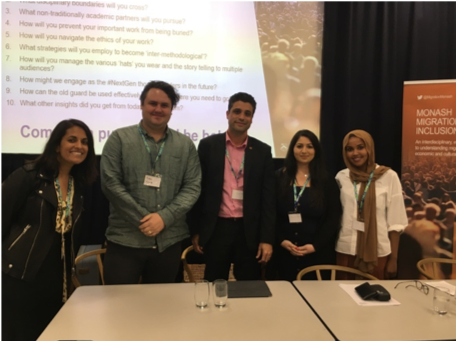
Picture 3: (from left to right) Dr Shanthi Robertson, Asher Hirsch (RCOA), Aleem Ali (Welcoming Cities), Tina Hosseini (Victorian Multicultural Commission), Najma Hassan (East African Women's Foundation)
In the final session, dedicated to reflections and closing thoughts, Wickes drew on key ideas from the day to form the following questions, challenging the next generation of migration scholars to consider the learnings of the day and how they might take them forward into their careers and the future of migration scholarship:
- What is your big idea?
- What disciplinary boundaries will you cross?
- What non-traditionally academic partners will you pursue?
- How will you prevent your important work from being buried?
- How will you navigate the ethics of your work?
- What strategies will you employ to become ‘inter-methodogical’?
- How will you manage the various ‘hats’ you wear and the story telling to multiple audience?
- How might we engage as the #NextGenMEM thought leaders in the future?
- How can the old guard be used effectively to get you where you need to go?
- What other insights did you get from today’s symposium?
The event was a great success with new insights, inspiration and networks strengthened among PhD candidates, early career researchers, established researchers, and representatives of government and the not-for-profit sector.
A post-event survey was circulated to all attendees and the feedback received (10 respondents) was extremely positive. 40% rated the event ‘excellent’ and 60% ‘very good’. Respondents liked the number of attendees (n~60), which one person remarked is “perfect for getting to know people (and potential future collaborators!) and gave those new to the field more confidence to speak their mind”, the affordability of the event was also well received, and the diverse program was “fabulous”, with “inspiring and thought-provoking” presenters.
Bursary recipient Sarah Burrage shared the following reflections:
I greatly thank TASA for presenting me with the opportunity to attend the 2019 NextGen Symposium hosted at the Immigration Museum, Melbourne. As a relatively new PhD student in the space of migration and refugee studies, it was beneficial for me to network with other postgraduate students and academics about their interests and key areas of research. Highlights of the day for me included hearing from key academics and industry partners about advancing best research practice and ethics, as well as seizing opportunities for future collaboration and research dissemination. Listening to strong and bold researchers such as Professor Sharon Pickering, Dr. Shanthi Robertson, Associate Professor Jane Wilkinson, Professor Karen Farquharson and Associate Professor Rebecca Wickes, I felt motivated to continue in this space of research and take a bolder approach in both sharing my research and in seizing future research opportunities.
And Ume Rubab Sheikh offered the following reflections:
As one of the bursary recipients for the Research Symposium on Refugee Experiences organized by MMIC, I found the experience to be very illuminating. It was a very well-organized event and all the speakers were top of their field and provided stimulating research and were very well-engaging in terms of discussions. The entire symposium was very beneficial for my research which focuses on the identity shift of Muslim refugee women arriving in Australia post 9/11. From the time of applying for the symposium to attendance, the process was made very simple by the ever-helpful organizing committee and I hope to attend further events that will be hosted in the future.
Acknowledgements
The organising team would like to thank the following individuals and organisations who have made this event possible:
Associate Professor Rebecca Wickes, Dr Helen Forbes-Mewett and the Monash Migration and Inclusion Centre for generously co-sponsoring and promoting this event, including support during the inception of the symposium idea.
Dr Sara James and the TASA Thematic Group Support Scheme for generously co-sponsoring and promoting this event.
The Monash Postgraduate Association (MPA) for their generous financial contribution and in-kind support.
Coles Elizabeth Street for their generous contribution to speaker gifts.
Bunnings Collingwood for their generous contribution to speaker gifts.
The Source Fitzroy for their generous contribution to speaker gifts.
Special thanks to Jan Molloy, Immigration Museum Melbourne, for her ongoing support in organising our venue at the Museum, catering, promoting the event widely, and ensuring the event is a success.
Special thanks to Sally Daly, TASA Executive Officer, for her ongoing support in promoting the event across the TASA community, website updates and logistical and other support.
A note on environmental responsibility: the symposium organisers have made a deliberate effort to reduce the event’s environmental impact through sourcing ethical and sustainable gifts for speakers, minimising printing, reducing wastage from catering and providing a plant-based menu. Participants were encouraged to bring reusable cups and water bottles.
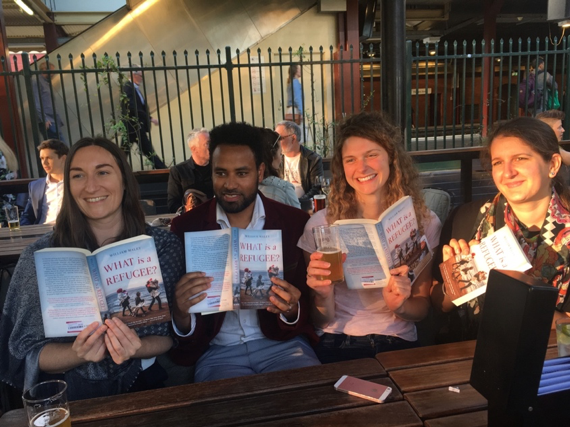
Picture 4 The MEM postgraduate representatives and organisers: (from left to right) Charlie Young, Goshu Tefera, Jora Broerse and Heidi Hetz. Missing: John van Kooy.
| Sociology of Education Summit:
My School, Your School, Our Schools
Christina Ho
| In the lead-up to the tenth anniversary of the My School website, the TASA Sociology of Education thematic group convened a summit titled ‘My School, Your School, Our Schools’.
The My School website, introduced by the Rudd Labor Government, provides information about every school in Australia, including schools’ enrolment figures, students’ levels of socio-educational advantage and other demographic information, levels of funding, and controversially, NAPLAN results.
As many presenters at the summit argued, the My School website symbolises the Australian education system’s embrace of neoliberal values, in particular, the notions of choice and competition. Armed with information about schools, we are told, families can ‘vote with their feet’ in choosing schools for their children, encouraging all schools to lift their game.
Held at the University of Technology Sydney during Social Sciences Week 2019, and attended by 75 participants, the ‘My School’ summit brought together researchers and practitioners to reflect on how Australia’s education system has changed over the last ten years, including how the My School website has changed how we view schools. Issues of educational inequality, diversity and the use and misuse of educational data were big on the agenda.
The summit’s keynote presenter was Professor Pasi Sahlberg (UNSW Gonski Institute for Education), who offered an incisive critique of the growing inequality in Australian education. Compared to Professor Sahlberg’s home country, Finland, and many other societies where education is more equal, Australia’s education system spends much less on early childhood and much more on private schools. It also has a much higher concentration of disadvantaged students in disadvantaged schools, and gives children much less time to play. All up, as Professor Sahlberg commented, ‘Australia has one of the best school systems in the world…for some of its children’.
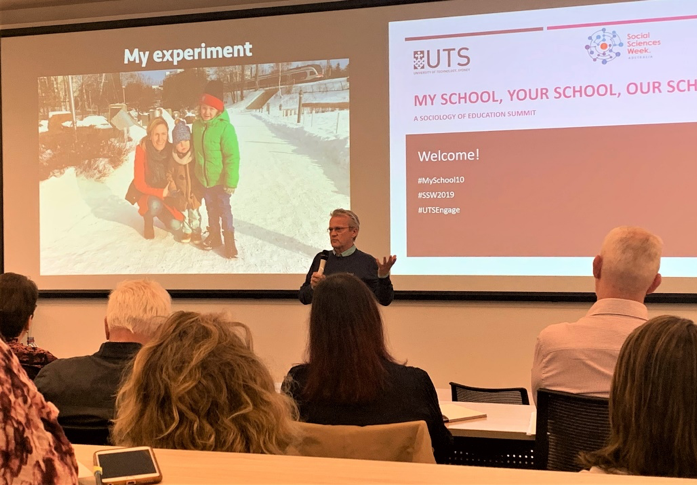
Media coverage of Prof Sahlberg’s presentation can be viewed here.
The conference then heard from 22 presenters, across four sessions, which examined testing, inequality, segregation, diversity, neoliberalism and dis/advantage. Many reported on research based on data from the My School website, showing the enormous value of the website for researchers. At the same time, many researchers documented the role of educational data, including that provided by My School, in fuelling the neoliberal school choice agenda.
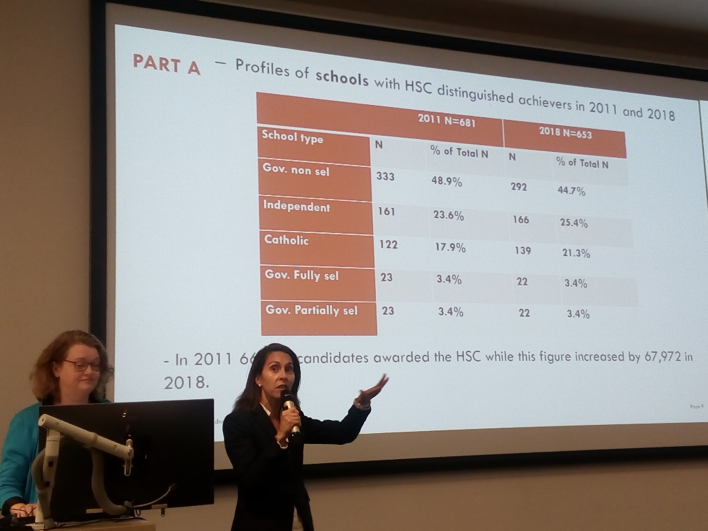
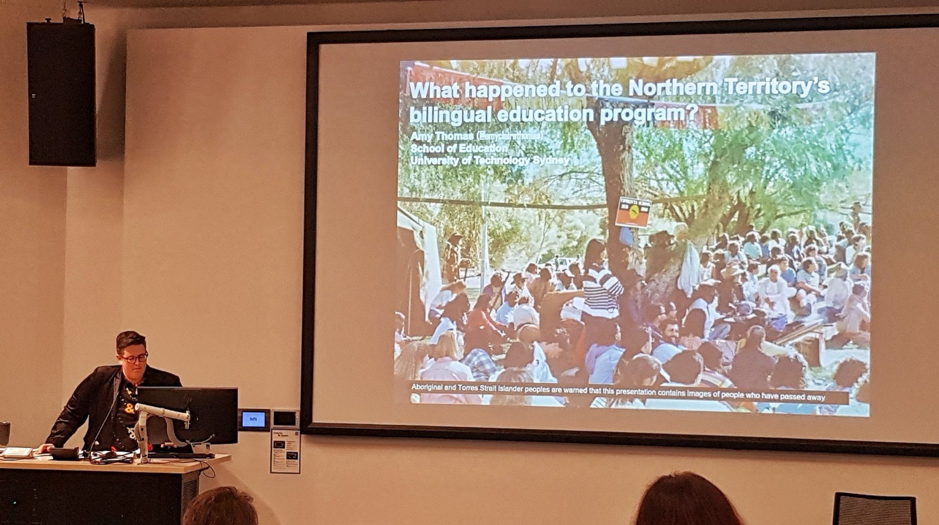
The conference ended with a plenary on the uses and abuses of education data, chaired by Sunil Badami and featuring:
- Maurie Mulheron (NSW Teachers Federation)
- Sharon Aris (University of Sydney)
- Chris Bonnor (Researcher and retired school principal)
- David Hetherington (Public Education Foundation)
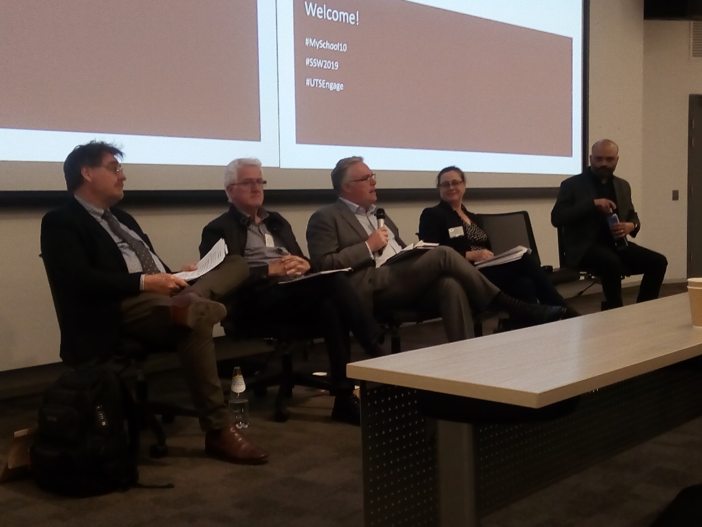
Using My School and other data, the plenary speakers documented the growing separation of students, with more disadvantaged students found in disadvantaged schools, and student achievement in NAPLAN becoming more and more unequal. While ‘choice’ in education is an appealing notion, the My School website does not facilitate choice for all families equally, the summit was told. Some benefit from choice more than others. Meanwhile, the vast majority of teachers reject NAPLAN and the publication of test results, but their voices are not heard in policy reviews.
Videos of the keynote and closing plenary can be found here.
The conference was followed by the book launch of Teacher for Justice: Lucy Woodcock’s transnational life, by Heather Goodall, Helen Randerson and Devleena Ghosh. The book was launched by Heidi Norman, Meredith Burgmann and Maurie Mulheron.
The conference convenors, Christina Ho (UTS), Martin Forsey (UWA) and Kellie Bousfield (CSU) would like to thank TASA and the UTS Faculty of Arts and Social Sciences for their financial support for the event.
[Photos by Christina Ho & Amy Thomas]
| Creativity and methodological innovation in the sociology of familial and intimate relationships – A TASA Families and Relationships Thematic Group event
Ashley Barnwell and Kris Natalier
| Our Creative Methods workshop was held on November 29 at Western Sydney University, Parramatta. Our motivation for the workshop was the recognition that as a long-standing, core sub-discipline, the field of families and relationships is deeply rooted in the established methods of qualitative and quantitative inquiry: the interview and survey. But as the diversity and ambiguity of familial and intimate relationships are foregrounded, sociologists are arguing for less traditional, more experimental ways of working. The field is a vibrant focus of methodological and conceptual innovation as scholars draw on interdisciplinary, creative, and technological advances to enliven interview and survey methods, and to devise new ways of theorising and getting to know the daily lives of families.
Our objective was to encourage conversations to support those sociologists attempting to forge responsive and creative methods to investigate contemporary families and intimate relationships, in ways that reaffirm the value of sociological inquiry, demonstrate its continued inventiveness and grow its inclusivity.
The day kicked off with a thoughtful keynote from Dr Quah Ee Ling Sharon (University of Wollongong), Using a decolonial feminist approach in research methodologies to investigate divorce and deal with vulnerable subjects. Sharon opened up ways of decolonising qualitative research and asked us to reflect on our own practices of feminist self-care when working with emotionally intense issues. This interactive approach set the tone of collaboration and creativity across the day. We then welcomed Dr Son Vivienne for our next keynote talk, Digital methods, storytelling, and their implications for understanding identities and intimate relationships. To start, Son got us to take off our shoes and look out over the smoky horizons of Western Sydney in a meaningful acknowledgment of country. Son then took us through their own creative video works about family and social policies and discussed the ethics of digital storytelling. In a powerful activity that challenged the primacy of detached, scientific forms of observation, we all participated in a drawing activity based on touch and feeling.
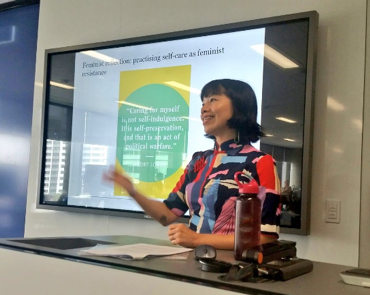 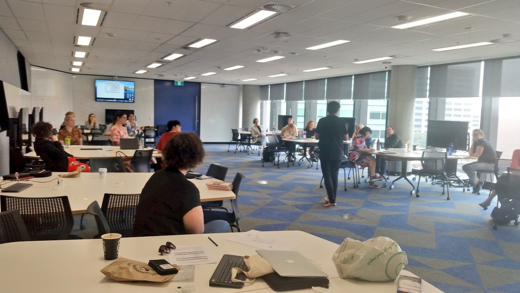
We then had two concurrent sessions where we heard from FRG members about their creative research innovations. In panel one we explored how to capture the meaning and texture of people’s experiences. Giselle Newton stepped us through her application of Systemic Functional Linguistics to transcripts of public hearings of inquiries into donor conception. Giselle illustrated its effectiveness in excavating meaning in what can initially read as ‘flat’ texts. Then, Fiona MacDonald explored the methodological, ethical and practical dimensions of embedding sound and voices in our publications as a way of encouraging our readers to attend to the lives of others. Jennifer Ayton shared a fascinating reflection on the aesthetics, politics and interpretive challenges of using art to analyse and represent the breastfeeding experiences of mothers. Jennifer’s presentation was co-authored by Emily Hansen, Eliza Burke, Lucy Bleach, Kate McIntyre.
In panel two, we discussed the challenges and lessons of working with creative methods. We started with an engaging talk from Adi Byrt on her feminist co-design research with new mothers of preterm babies. In this inventive project, Adi uses ‘empathy probe kits’ of her own very dapper design to provide mood charts and other paper materials that allow her participants to express and document their daily experiences. We then heard from Dr Michelle Brady, who is working with a team to create innovative ways to track mothers’ “carescapes” or the spatio-temporal terms of their caring responsibilities. Michelle showed us some of the creative mapping and graphic elicitation methods they have used and asked important questions about the ethics of using often time-consuming creative methods with people who are already time-stressed. Michelle’s presentation was co-authored with Juan Zhang. Finally, we heard from Alexandra Ridgeway who shared her insights from her PhD research on the family practices of female migrant divorcees in Hong Kong and Melbourne. Alex spoke about the importance of being responsive and flexible as a feminist practice and explained how she ended up abandoning a digital storytelling component because it was not appealing to her participants.
After lunch, we heard a third keynote talk from Dr Ash Watson (University of New South Wales), Creative practices in social research: a history and trajectory. Ash led us through the history of creative synergies at the very founding of Sociology as a discipline, as well as three cutting-edge projects in creative sociological practice, including Ash’s own novel Into the Sea (coming out with Brill in 2020) and her So Fi Zine. This was a reminder that innovation and risk-taking have always driven sociologists’ work even if these approaches have not always been celebrated in dominant narratives of the discipline. Ash then led us through a hands-on zine-making workshop. We each made a mini-zine and then a collaborative zine on themes of feminist experiences in patriarchal and neo-liberal academia. Zine making was accompanied by a vibrant discussion about the future of creativity in social research on families and relationships.
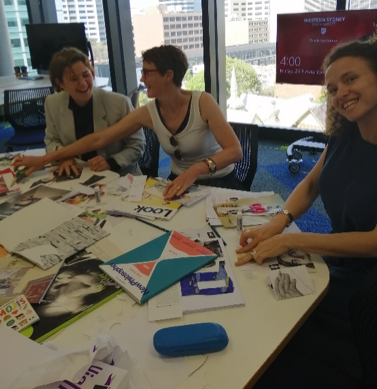 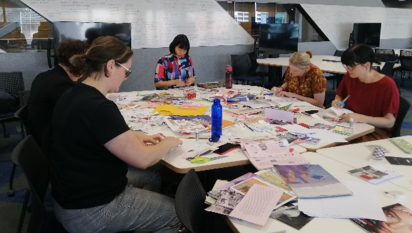
We celebrate the contributions of everyone who participated in this event. We were so heartened that the tone of the day was one of openness and vulnerability, and collegial and critical engagement with the ideas and practices of our colleagues. In a context of work intensification, precarious employment and institutional demands that are only sometimes acknowledging the substance of our research, the workshop offered people the opportunity to connect and discuss research hopes, futures and challenges. We are excited to build more opportunities for fun, connection and respect into the FRG thematic group.
| Health Day 2019:
Data, Technology and Sociology in the Age of Digital Health
Sophie Lewis, Anthony Smith, and Marika Franklin
| The TASA Health thematic group hosted a one-day symposium on the 29th November 2019 – ‘Data, Technology and Sociology in the Age of Digital Health’. The event focused on sociological thinking about digital health technologies and innovation, including their uses and effects across different health and care contexts. This well attended event brought together early, mid, and established health sociologists and postgraduate students from across NSW, Victoria, Queensland and Tasmania, as well as international attendees from New Zealand and Denmark. Attendees engaged in discussion about key questions and challenges around digitising health and new directions for sociological inquiry.
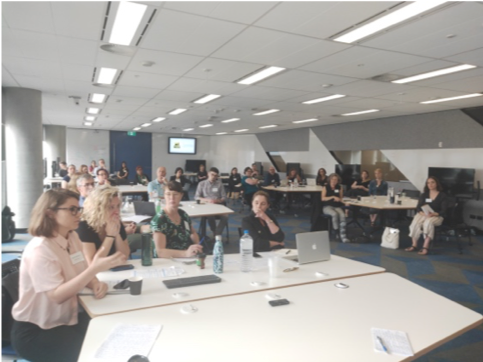
The day commenced with a morning session of invited talks from Professor Alan Petersen, Monash University and Dr Paul Byron, UTS. Professor Petersen discussed the social implications of digital health technologies, and the lessons learned from his body of work on digital health and technological development. He argued it was critical for sociologists to interrogate the promise and ‘hype’ of digital technologies, despite the often-limited evidence of benefit. He also outlined how technologies generate new health imperatives and may have unintended harms (e.g. privacy implications, increasing healthcare inequity).
Dr Paul Byron talked about the everyday practices of care among LGBTIQ+ young people across digital/social media spaces (e.g. Tumblr, twitter). He drew attention to the importance of informal, peer-based care practices already occurring across digital spaces; highlighting the potential for ‘digital cultures of care’ and peer support to inform and contribute to mental health policy and service provision. Dr Byron called for a less instrumental approach to social and digital media and thinking about young people as already embedded in networked practices, rather than as ‘going online’ for information and support.
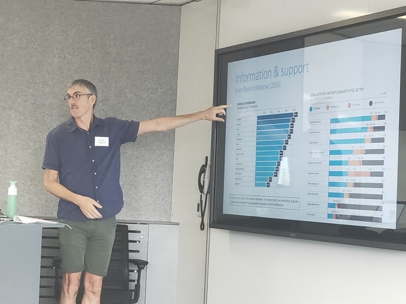
Dr Paul Byron, UTS
The mid-day session included invited talks from Dr Jacinthe Flore, RMIT and workshop delivered by Professor Deborah Lupton, UNSW Sydney. Dr Flore presented on Abilify MyCite, the first ‘smart antipsychotic’ (a pharmaceutical embedded with a digital ingestion tracking system). She used this as an exemplar to examine treatment as part of an intricate network of socio-material and socio-technical relations (of chemicals, technology, apps and non-human and human actors). Flore outlined how digital technologies are potentially transforming relations of care and subjectivities in mental health.
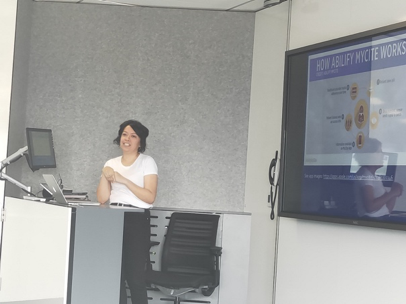
Dr Jacinthe Flore, RMIT
Professor Lupton presented an invited talk and workshop on innovative methods for understanding the more-than-human worlds of digital health. She discussed how feminist new materialism theory and approaches from design and arts-based methods may be used to provide new ways of thinking about personal data and how data are materialised across words and images. Lupton then led an interactive session in which attendees were asked to make postcards from the future of healthcare. This activity produced a range of tech-utopian and dystopian imaginaries about the future of healthcare in a digitised world.
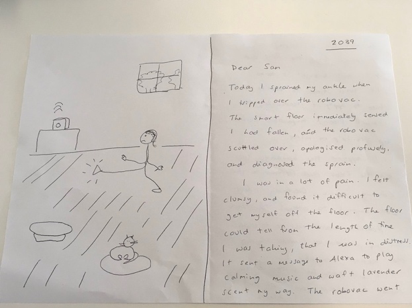
Professor Lupton’s workshop: postcards from the future of healthcare
The afternoon session included presentations by academics and Ph.D. candidates from ANU, La Trobe, and UNSW Sydney. Presentations spanned topics including: the implementation of electronic health records and their potential for institutional change in consumer healthcare engagement; networking apps as both emerging sites of healthcare intervention and new forms of surveillance; what resources online communities offer LGBTQIA young people around sexuality and gender identity; the potential for online communities to create spaces for queer intimacy; privacy concerns and the threat of harms to vulnerable groups when appealing to ‘imagined audiences’ across crowd funding platforms; expansion of social network monitoring as part of public health surveillance; how expertise is being reconfigured between IT companies, data brokers, and public health actors; and the political economy of big data and how personal health data are constituted and used as assets.
The Thematic co-convenors would like to acknowledge the support of TASA through a 2019 Thematic group grant, which included two travel bursaries to support Ph.D. candidates to attend.
With my PhD on how healthcare workers use sexual networking apps in the Philippines to reach their community, I often feel like I am working in a very niche area, yet I did not feel this way at the TASA Health Day. It was an invaluable experience to be surrounded by other researchers passionate about exploring the promise that digital health interventions offer, and their limitations and unintended consequences. I really appreciated the opportunity to present my initial findings, and for the helpful comments received, which have highlighted the important role that context places in shaping approaches to healthcare. It was also nice to meet some long-time Twitter friends! (Brooke Hollingshead, Ph.D. candidate and TASA bursary recipient).
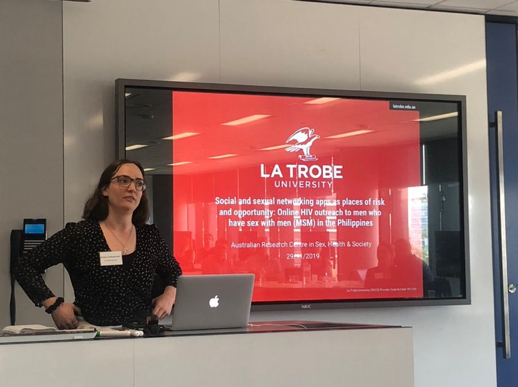
Ph.D. candidate and TASA bursary recipient, Brooke Hollingshead
The focused environment of TASA’s Health Day was a great space to share and discuss work, as well as to debrief on the preceding days of TASA’s annual conference. With a mix of leading health sociology researchers and ECRs attending, I enjoyed this opportunity to deepen relationships and talk about ways we might collaborate into the future. Thanks to TASA for supporting my stay in Parramatta. (Rachel Rowe, Ph.D. candidate and TASA bursary recipient).
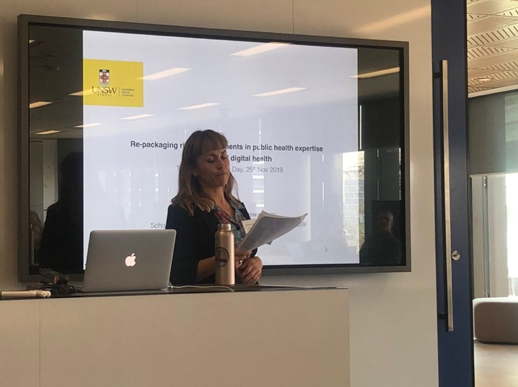
Ph.D. candidate and TASA bursary recipient Rachel Rowe
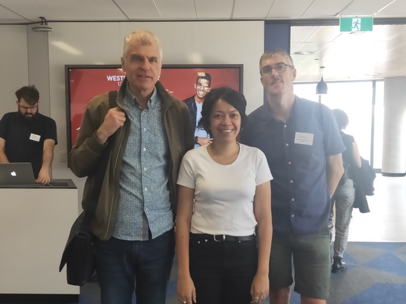
Invited speakers Professor Alan Petersen, Dr Jacinthe Flore, and Dr Paul Byron
| Scholarship and Bursary Reports
| Commencing with the TASA Conference at Western Sydney University, we have offered Scholarship and Bursary recipients the opportunity of providing digital reports.
This year TASA invited scholarship or bursary recipients to create short videos where they could talk about their experience at TASA2019. Three such videos were created:
Heidi Hetz
Alexandra Ridgway
Elaine Pratley
If you would like help recording, or being recorded for Conference reports, please email Roger Wilkinson at digitape@tasa.org.au.
| Precarious Work Scholarship report
Ramón Menéndez Domingo
| TASA conference has been a success this year. The setting at Western Sydney University was unbeatable. The Parramatta City and South campuses combined the accessibility and sound technological equipment of a city campus with the quietness and proximity to nature of a suburban one. I liked both and everything in between, the city and the Parramatta River.
TASA started strong with a Postgraduate day that gets only better every year, featuring meaningful advice from academics to postgraduate students. It followed with a keynote session from Prof. Maggie Walter that revealed the importance of doing a Sociology of Knowledge to understand knowledge-production about Aboriginal Australia. TASA program involved many high quality sessions that were all equally well balanced out. From the more crowded sessions such as Genders and Sexualities or Sociology of Youth to other less well attended ones, such as Urban Sociology or Risk Societies, all of them were interesting in their own ways. The bigger sessions offered opportunities for more rigorous presentations and debates, while the smaller ones had a more intimate tone that provoked insightful conversations, which continued on during the lunch and teas. Book launches seemed emotional to me, where members’ successes were shared and celebrated by the readers of the different authors who launched their books. I only missed a specific session on technology and its impact on human lives, but this topic repeatedly surfaced in various sessions. This gap was also somewhat addressed with an ad hoc symposium about technology and health organised for Friday, however, this was possibly not enough, and a more specific session would be a nice addition for the years to come at TASA conferences.
Overall, five hectic days that went very quick and were extremely valuable for my research. My goal for TASA this year was to write a journal article and send it before I presented it there. I wrote half an article instead, which, considering my circumstances this year, was more than mission accomplished for me. I know that I will finish my article, but without TASA I could not have even started it. As authors and researchers we need audiences, and TASA and its different sections fulfils that role to me. TASA is part of that audience that I would like to address with my work, so I cannot conceive the latter without the former.
Finally, the conference dinner turned out to be a fun event to close the conference, including a surprisingly vibrant awards ceremony and the dance that followed. I am looking forward to go back to TASA next year and to continue my journey as a sociologist and a researcher. Attending events like this one gives me the strength and courage that I need for that. Above all, it makes me feel part of a community of researchers that reads and cares about my work. As an academic, this is more than I could ask for, more than enough to make me happy.
|  | |